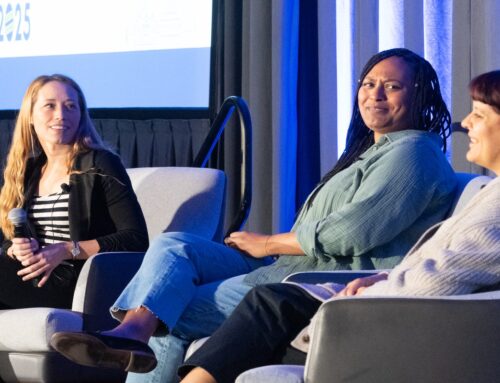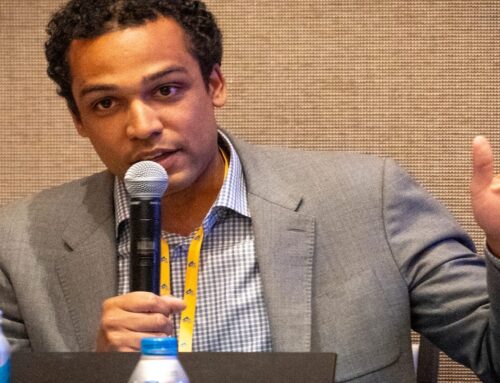4 tips for women starting their investing journey
April 25, 2025
Eighty-five percent of women surveyed for Charles Schwab’s Women Investors Survey 2025 wish they had started investing earlier. Schwab Branch Network head Jeannie Bidner joins Wealth with Brad Smith to share tips for women interested in investing.
To watch more expert insights and analysis on the latest market action, check out more Wealth here.
00:00 Brad Smith
According to a study from Schwab, nearly all women investors say handling investments makes them feel empowered and that they’re confident in their financial decisions. And 85% say that they wish they started investing earlier. Here with more insights and advice for women at all stages of their investing journey. We’ve got Jenny Binder, who is Schwab branch network head. Great to have you here with us, Jenny. So, what are some of the reasons that you’re hearing from women about why and how they get started in investing?
00:52 Jenny Binder
Yeah, thank you, Brad. Thanks for having me. We are seeing some incredible results from our recent women investor survey. Uh, women cite that some of their top strengths are patience and discipline, which is really no surprise, given most are, you know, really focused on reaching long-term financial goals. We also know that there have been many, been many lessons learned along the way. Uh, 58% say that staying invested through market volatility has been an important lesson for them. 57% cite acknowledging their risk tolerance, and another 54% say diversifying their investments are really important for them.
01:54 Brad Smith
So, what are some of the challenges that you’re hearing women face when it comes to investing?
02:11 Jenny Binder
To start, I would say that it’s worth noting while there are many challenges, most feel like they’re on the right track to meeting their financial goals, about 90%, which is incredibly encouraging. That being said, the survey found that there are still three hurdles for women to investing. Uh, first, limited earnings. About 65% cited limited earnings could be due to low, lower pay or wage gaps, uh, potentially career breaks or caring for children. Uh, two, lack of early financial education. And then the third one, limited funds to start, so just a feeling like there’s no excess money to get invested. Uh, women also live longer than men, too, so need to plan for longer time horizons.
03:27 Brad Smith
So, as we think about the last few years, it’s become extremely evident how much more people are comfortable talking about their investments. I mean, some posting about it daily on social media and talking about it with their friends. What is the role of community that you’re seeing?
04:02 Jenny Binder
Community is essential. Um, women show that two-thirds, uh, discuss financial topics with others, most likely family and friends. And often they’re doing so to learn, to support others in decision making, and also to validate their own decisions. Uh, this exchange of knowledge, you know, obviously builds competence and also just helps to normalize some investing conversations.
04:50 Brad Smith
So, what are some tips that you have for potential women investors, those who are saying, you know what? I’m just trying to figure out the right entry point and how much I should start to put into the market.
05:11 Jenny Binder
Yeah. First, I would focus on education. Now, more than ever, as you mentioned, there is, there are so many resources that offer clear and simple financial information out there. Uh, if you’re in a relationship, I would say both members of the couple should have a complete knowledge of your both individual and shared finances. So, whether or not each of you is actively involved in financial decision making, you should both know the big picture. Things like, uh, net worth, cash flow, debt, insurance, investment accounts, retirement savings, and estate planning. Third, I would say know your worth. Do some wage comparisons for your job, don’t be afraid to negotiate for compensation, have a sense of the work you do and those transferable skills, and where you can apply to multiple jobs. Uh, fourth, I’d say create a strong financial foundation, get the basics squared away, create a budget, get an emergency fund with at least three to six months of essential expenses, making sure that you have adequate insurance also to prepare for the unexpected. Uh, build your credit history, stay on top of your debt. I know it’s easier said than done, but try not to charge more than you can pay off each month. Have a plan to pay off if you do have revolving debt, those that high interest debt that you may be carrying. Um, start saving or increase, increase your savings ASAP. You can, you know, write down your goals, short, medium, long term. You can have a plan, uh, for each of those goals, and the more specific you are to your time horizons, the better, and make sure you’re saving for retirement. That should be at the top of your list. And then last, I would say, invest early. You mentioned at the beginning, uh, 85% of women investors cite that they wish they would have started sooner. So, you don’t have to have a lot of money to start investing, don’t be afraid to start small, consider a $100, $500, uh, and just go from there, build from there. When you’re young, you have time, remember you have time to ride the market ups and downs, uh, and don’t let volatility scare you away.
08:44 Brad Smith
Jenny, just lastly, while we have you, we know that women are set to be the largest beneficiaries of the great wealth transfer. How are we seeing in some of the kind of early sentiment and strategy around how women are investing right now, where that could benefit certain industries, certain investment ideas, and even the community that is then bolstered even further from there?
09:22 Jenny Binder
Yeah, I mean, you know, the great wealth transfer that’s coming before us, uh, we know it’s going to change a lot of the demographics of, of who’s sort of in control of a large amount of the wealth and investing. Um, you know, no surprise to me when we, when we surveyed our female investors, uh, when they first started investing, they’re doing so to grow their money to save for retirement. Uh, they’re very focused on having patience and risk tolerance, um, over time. And you know, notably about a quarter say that they start investing simply just to learn how to invest. And so, you know, we’re sort of seeing that play out across, um, and amplify year over year. And so it’s exciting to see and, and again, just very encouraging, um, with the trends that we’re witnessing right now.
Terms and Privacy Policy
Search
RECENT PRESS RELEASES
Related Post




